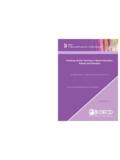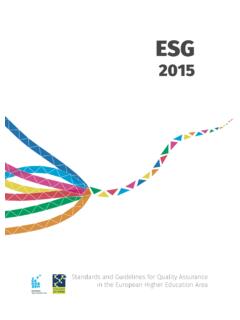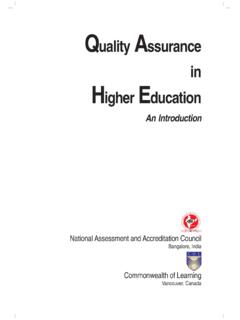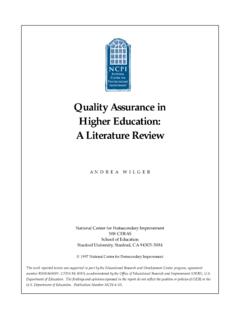Transcription of UK Quality Code for Higher Education
1 UK Quality Code for Higher Education Part A: Setting and Maintaining Academic Standards The Frameworks for Higher Education Qualifications of UK Degree-Awarding Bodies October 2014. PART. A. Contents List of abbreviations and terms used 1. About the Quality Code 3. About Part A 4. About the Frameworks for Higher Education Qualifications of UK Degree-Awarding Bodies 5. External links 6. The Frameworks for Higher Education Qualifications of UK Degree-Awarding Bodies 7. 1 Introduction 7. 2 Main features of the Frameworks for Higher Education Qualifications of UK Degree-Awarding Bodies 7.
2 The status and remit 7. The purposes 9. The approach 9. How the frameworks are required to be used 10. Quality assurance 10. Status within Europe 11. Relationship with other UK national qualification frameworks 13. Relationship with credit 14. 3 The frameworks and their levels 15. The levels 15. Table 1: Examples of the typical Higher Education qualifications at levels of the Frameworks for Higher Education Qualifications of UK. Degree-Awarding Bodies and their corresponding cycle in the QF-EHEA 17. 4 The qualification descriptors 19. Descriptor for a Higher Education qualification at level 4 on the FHEQ: Certificate of Higher Education 21.
3 Descriptor for a Higher Education qualification at SCQF level 7 on the FQHEIS: Certificate of Higher Education 22. Descriptor for a Higher Education qualification at level 5 on the FHEQ: foundation degree 23. Descriptor for a Higher Education qualification at SCQF level 8 on the FQHEIS: Diploma of Higher Education 24. Descriptor for a Higher Education qualification at SCQF level 9 on the FQHEIS: bachelor's (non-honours) degree in Scotland 25. Descriptor for a Higher Education qualification at level 6 on the FHEQ: bachelor's degree with honours 26. Descriptor for a Higher Education qualification at SCQF level 10 on the FQHEIS: bachelor's degree with honours in Scotland 27.
4 Descriptor for a Higher Education qualification at level 7 on the FHEQ and SCQF level 11 on the FQHEIS: master's degree 28. Descriptor for a Higher Education qualification at level 8 on the FHEQ and SCQF level 12 on the FQHEIS: doctoral degree 30. 5 Using UK qualification descriptors 31. The relationship between the qualification descriptors and other UK reference points for academic standards 31. The relationship between qualification descriptors and degree-awarding bodies' own reference points 32. 6 Responsibilities for implementing an outcomes-based approach to the award of qualifications 32.
5 Positioning qualifications at the appropriate levels of the Frameworks for Higher Education Qualifications of UK Degree-Awarding Bodies 32. Aligning programme learning outcomes with the relevant qualification descriptor in the Frameworks for Higher Education Qualifications of UK Degree-Awarding Bodies 33. Designing, approving, monitoring and reviewing programmes and qualifications 33. Assessment of learning outcomes 34. Awarding qualifications 34. Titling conventions for qualifications 35. Annex A: Advisory group 38. Annex B: Dublin descriptors 40. Shared Dublin descriptors for short cycle, first cycle, second cycle and third cyle awards 40.
6 Annex C: Illustrative table of credit 43. List of abbreviations and terms used Credit Credit is awarded to a learner in recognition of the verified achievement of designated learning outcomes at a specified level. Cycles Sequential levels identified by the Bologna process (short cycle within the first cycle, first cycle, second cycle and third cycle) within which all European Higher Education qualifications are located. CQFW Credit and Qualifications Framework for Wales EQF European Qualifications Framework for Lifelong Learning Degree-awarding bodies A UK Higher Education provider (typically a university) with the power to award degrees, conferred by Royal Charter, or under Section 76 of the Further and Higher Education Act 1992, or under Section 48 of the Further and Higher Education (Scotland).
7 Act 1992, or by Papal Bull, or, since 1999, granted by the Privy Council on advice from QAA (in response to applications for taught degree awarding powers, research degree awarding powers or university title). Exit qualification A qualification which may be awarded on completion of an intermediate point of studies in a longer programme of study (when a student leaves the programme) but for which the student has not registered at the outset. FHEQ The Framework for Higher Education Qualifications of Degree-Awarding Bodies in England, Wales and Northern Ireland FQHEIS The Framework for Qualifications of Higher Education Institutions in Scotland Framework levels A series of sequential stages (a developmental continuum).
8 Expressed in terms of a range of generic outcomes against which typical qualifications can be positioned. Intermediate qualification A separate qualification which can be awarded at a specific stage or level part of the way through a longer programme of study and for which a student can register at the outset of study. Level descriptors A statement of the generic characteristics of outcomes of learning at a specific level of a qualifications framework, used as a reference point. Qualification A degree, diploma or certificate awarded by a competent authority (in this context a degree-awarding body) in recognition that particular programme or qualification outcomes have been achieved following the successful completion of a recognised Higher Education programme of study.
9 Qualification descriptor Generic statements of the outcomes of study associated with a specific qualification. They provide clear points of reference that describe the main outcomes of a qualification. Programme (of study) An approved course of study that provides a coherent learning experience and normally leads to a qualification. This includes research programmes. 1. Programme learning Statement of what a learner is expected to know, understand outcomes and/or be able to demonstrate after completion of a designated programme of study (which leads to a qualification).
10 These are statements of holistic outcomes and not simply the sum of the parts (the learning outcomes of individual modules). PSRBs Professional, statutory and regulatory bodies QF-EHEA Framework for Qualifications of the European Higher Education Area Reference points Reference points are collectively agreed requirements or points of comparison (at international, national and degree-awarding body level) which are used by degree-awarding bodies to ensure consistency in academic standards. SCQF Scottish Credit and Qualifications Framework Threshold academic The minimum acceptable level of achievement that a student standards has to demonstrate to be eligible for an academic award.








